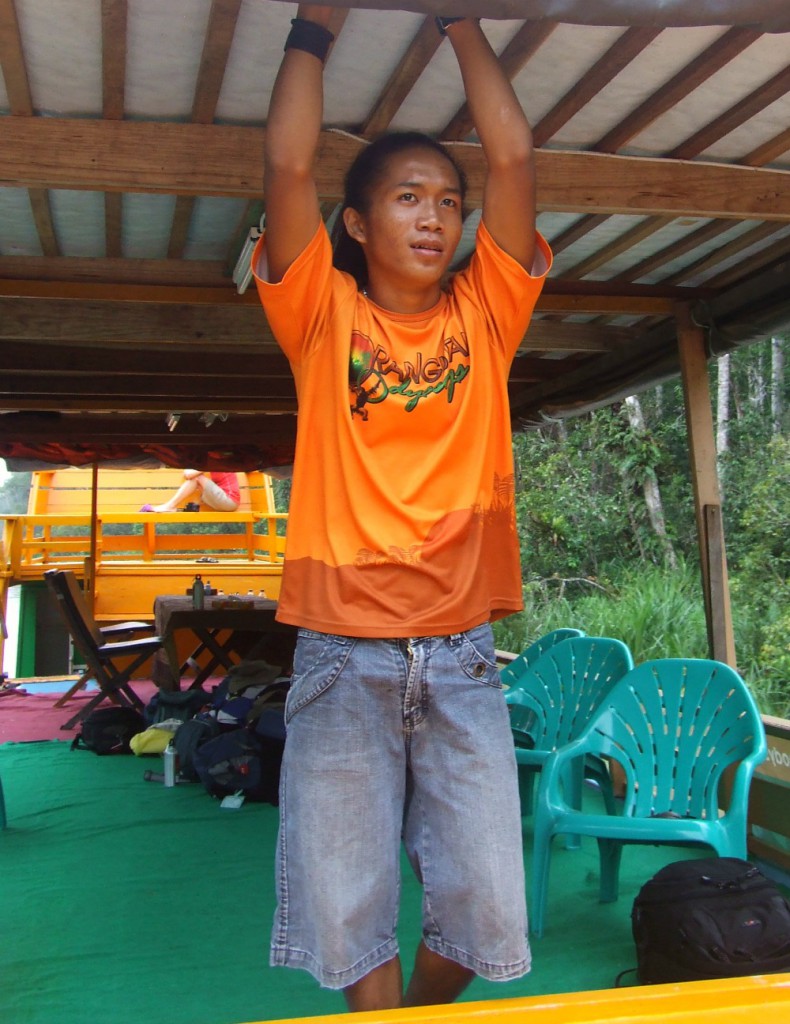Pangkalan Bun feels like a place best experienced properly from the back of one of the local’s fast moving scooters.
I’m not even sure why I wanted to do it so badly… I’m beginning to think I’m actually more comfortable when I’m outside my comfort zone.
The thought of mingling with the traffic, being a part of the organised chaos that rules the streets here, rather than just observing… it’s an intoxicating concept.
I relay my wish to our local guide, Ivend– will he take me for a ride on his scooter, please? His eyes pop wide open and he shakes his head slowly. I get the distinct feeling I may be the first ever guest of Orangutan Odysseys to make this particular request.
The next day, I ask Garry, the boss man, instead. He agrees, reminding me, quite sensibly, that I’ve signed a waver and I’m incurring all liability should anything go wrong. He also tells me there’s no way he’s letting me on the back of Ivend’s scooter (admittedly quite beat up from it’s fourteen past accidents). He suggests taking the Orangutan Odysseys scooter instead.
“Miss Lori, gila,” grins Ivend, using a word he’d taught me day before. “Miss Lori, crazy”.
I’m not going to argue with that.
Motorbike helmets are, from what I’ve observed so far in Pangkalan Bun entirely optional accessories, so I’m relieved when Ivend shows up with two of them. One is expertly airbrushed with the Orangutan Odysseys logo- done by a local, Garry tells me, all freehand.
I jump on the bike behind Ivend, wrap my arms loosely around his waist, and he pulls out of the long, straight driveway of the hotel and turns left into the supple slipstream traffic of central Pangkalan Bun.
To be honest, we’re not going quite as fast as I’d like to. But I can see how crashing the company bike, with a guest onboard, might be bad for Ivend’s career prospects. I can only imagine how much it would enhance his other big reputation in his hometown of Kumai, just down the road from here. He’s a ‘playboy’, he tells us, and fills us in on his antics during the week, the girls he’s currently dating and the ones he used to date, the ones he want to date and the ones his mates are dating.
Discussing it with Erin, we agree that his cheeky, entertaining stories are probably based in truth. With brilliantly spoken English, a good job, extremely long fingernails (the height of fashion amongst Indonesian men, of all ages- “We do it… for attention” says Ivend, and the admittance that men here are allowed to partake in vanity without it affecting their masculinity is refreshing), eyeliner on his lower lids, long, salon-straightened hair (“I want to look like an orangutan!” says Ivend, in all seriousness), and a passion for reggae music… for any Bornean girl, Ivend is a catch.
And he totally knows it.
Despite- maybe because of- that, Ivend is excellent at his job. As we cruise around the streets of Pangkalan Bun, he points out the sights, the activities, the people as we pass them.
We pass groups of school children sucking iced tea from small plastic bags, secured around a plastic straw. We see women dressed in yellow suits, blue hijabs and traditional straw hats, sweeping the streets with straw brooms.
Street vendors push carts that sell dumpling and fried duck, nasi goreng and- bizarrely- KFC chicken. Every two hundred metres is a tiny ticket-booth sized stall selling cigarettes, packets of rice snacks and milkshake powders, and glass bottles full of petrol to be poured into the hundreds of scooters that pass by every day.
We drive past the saw-mill section of town and it smells of clean, crisp, freshly sawn ironwood. In front of large, decadent, beautiful green mosque, a man with a basket stands between the two lanes of traffic, collecting money from the devout.
The air comes in small, sharp pockets of smell; the way it always does on the back of a motorbike, and I experience the city through my senses- fried food and petrol, the fresh fish scent of the river. The smell of people, of sweat and blood and urine and life. All mixed with the occasional deep green musk of the jungle that surrounds us.
***
We don’t crash. I don’t die. We make it safely back to the hotel, where a car is waiting to take us to the local markets. The markets are small and cramped, a labyrinth of tiny shops tucked away between two streets. There are hats and t-shirts, toys and make-up. A dressmaker’s shop filled with a rainbow of ribbons and sequin and zippers. Bag shops and shoe shops, places to buy veils and saris and hijabs.
The locals we encounter are curious, welcoming and friendly, laughing good-naturedly when they spot Erin taking photos of just about everything, happy to assist us without the incessant heckling we experience later in Bali. The prices are cheap, the quality ranges from awful to decadent.
The souvenir shops in Pangkalan Bun are tiny and there’s so few of them that I wasn’t even aware they existed until Ivend directed our hotel driver to stop in front of two nondescript storefronts. On-the-street-parking of cars in Pangkalan Bun is done under the guidance of men dressed in dark blue, who stop traffic with hand signals and direct the driver into a parking spot previously occupied by milk crates or boxes. A flattened cardboard box is provided as a windshield cover, to prevent the car from heating up. A small fee is exchanged upon leaving. It’s a delicate process that seems to keep that balance between organised chaos and disorganised anarchy- Garry tells us that, in the four years he’s been visiting here regularly, he’s only seen one major traffic accident; and from what Ivend says most scooter accidents are minor, with both the bike and the riders coming away relatively unscathed.
We buy souvenirs, and most of them are gorgeous- the tacky ones are few and far between, and I don’t see a single thing painted with a tropical sunset or spouting ‘I Heart Pangkalan Bun!’. It’s more carvings and bracelets, beaded handbags and therapeutic oils made from the natural medicines we’ve seen in the jungle.
The only other tourist-centric shops we see are three tucked close together at the airport, all selling identical merchandise. Again, the shopkeepers are friendly and helpful, without being overbearing or (as I discovered they can be, later in Kuta) slightly terrifying. After the rush of travelers come and go for the two mid-afternoon flights, the tiny stalls close again. The shop keepers cover their merchandise with colorful cloth and disappear into the peaceful, busy rhythm of Pangkalan Bun.




























{ 1 comment… read it below or add one }
I’m loving reading these! Let those of us stuck at home in murky June live vicariously through you!
(Also, Ivend? Total babe.)
Whoa, Molly recently posted…One of ‘The Fears’: Wasted Potential and the Well Running Dry